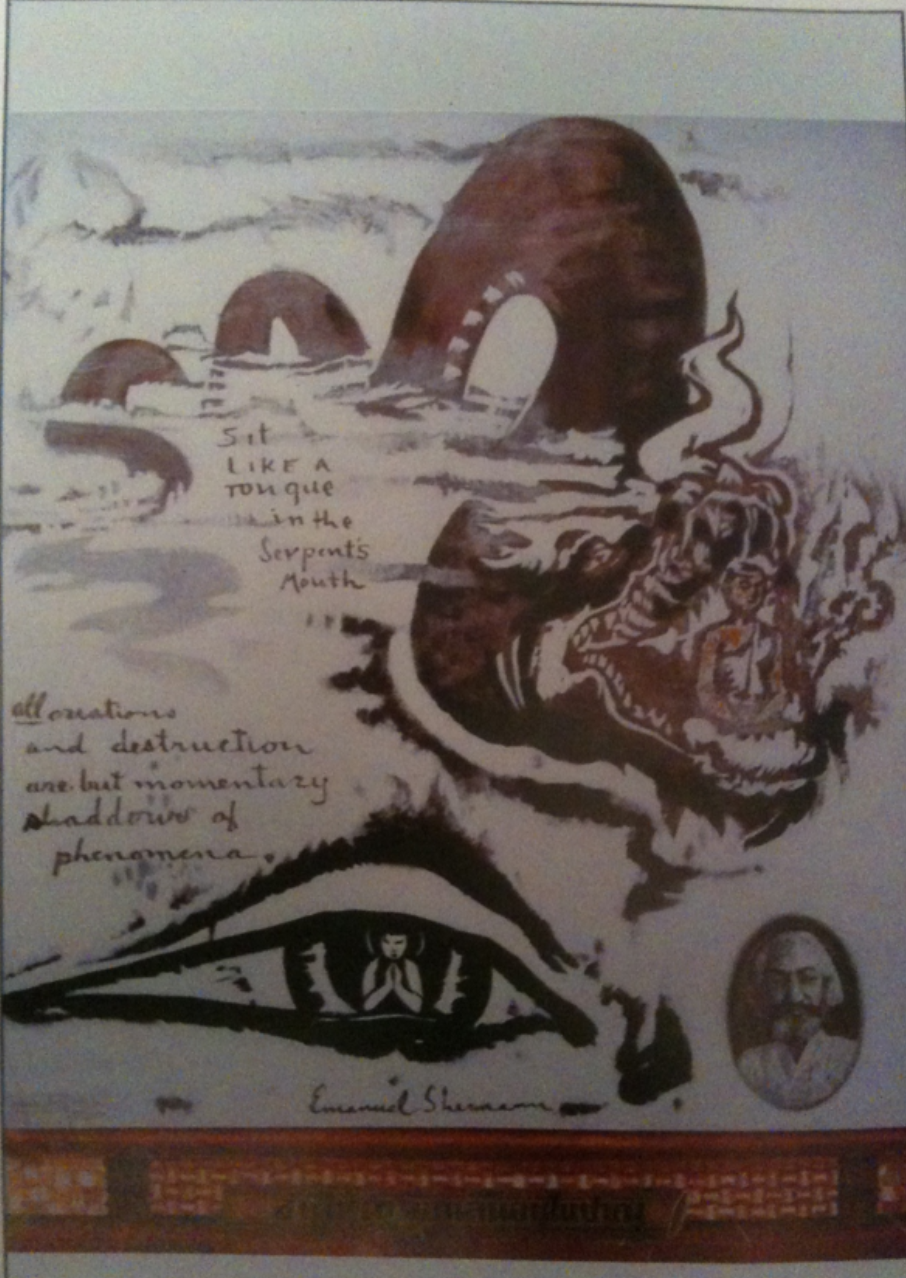อยู่ให้เหมือนลิ้นงูในปากงู Sitting in the Serpent’s Mouth
- Jan 3, 2018
- 2 min read

ภาพนี้เรียกว่า “ภาพอยู่ในปากงู” หรือ “อยู่ให้เหมือนลิ้นงูอยู่ในปากงู” ท่านจงดูให้ทั่วก่อน. จงดูเป็นพิเศษ, จ้องดูที่ภาพลูกตา : ในลูกตามีคนพนมมืออยู่ หมายความว่าคนนี้มันรู้จักใช้ประโยชน์แก่ลูกตา. แล้วก็ดูให้ดีเป็นพิเศษตรงที่คนที่นั่งอยู่ในปากงู บนดอกบัว แล้วก็ไม่ถูกเขี้ยวงู, แล้วที่มุมขวาข้างล่างนั้น มีภาพคนนั่นน่ะ เป็นภาพศิลปินผู้นี้ที่เรียกกันว่าเชอแมน ๆ อ้าวทีนี้ก็ดูเรื่องราวต่อไปว่า ถ้ามีลูกตาก็ควรจะมองเห็น, มีลูกตาชนิดที่มองเห็นความเป็นจริงในโลก จนสามารถอยู่ในโลกอย่างไม่ถูกต้องกับพิษของโลก หรือเขี้ยวของโลก. โลกเต็มไปด้วยเขี้ยวที่มีพิษร้าย คือสิ่งที่จะทำให้เกิดความทุกข์นั้นมีได้มากมายหลายอย่าง และเพิ่มขึ้น ๆ จนแทบว่าจะกระดิกตัวไม่ได้ ถ้ากระดิกตัวไม่เป็นก็จะถูกกับเขี้ยวงูทันทีในโลกนี้ โดยเฉพาะอย่างยิ่งในโลกปัจจุบันที่เจริญด้วยวัตถุซึ่งเป็นเหยื่อของกิเลส.
ขอให้นึกถึงการที่นั่งอยู่ในปากงู เหมือนลิ้นงูไม่ถูกกับเขี้ยวงู. ลิ้นงูก็อยู่ในระหว่างเขี้ยวงูนั่นเอง ไม่เคยถูกกับเขี้ยวงู ทำตนเหมือนกับว่าลิ้นงูอยู่ในปากงู คือมีชีวิตอยู่ในโลกนี้อย่างไม่กระทบกระทั่งกับอันตรายใดๆ ในสมัยนี้ โดยเฉพาะแล้วมันก็มีมากเหลือเกิน เพราะว่าการผลิตหรือความก้าวหน้าแห่งการผลิต : ผลิตแต่สิ่งที่จะเอามายึดมั่นถือมั่นให้เป็นตัวกู ของกู แล้วมันก็กัดเอา. เกิดความรู้สึกว่าตัวกูของกูที่ไหน มันก็กัดที่นั่น เกิดเมื่อใดมันก็กัดเมื่อนั้น, มากน้อยเท่าไรมันก็มากน้อยเท่านั้น, ดังนั้นคนในโลกจึงเป็นโลกประสาทมากขึ้นทุกที แล้วเป็นบ้ากันมากยิ่งขึ้นทุกที แล้วก็ตายหรือต้องตายกันมากยิ่งขึ้นทุกที เพราะว่านั่งไม่ดีไม่เหมือนกับว่าลิ้นงูในปากงู.
ขอให้ทุกท่านที่เผอิญมาเกิดในโลกนี้ ในยุคนี้ ซึ่งเต็มไปด้วยเขี้ยวของโลกอย่างทีกล่าวมาแล้ว คือว่า รูป เสียง กลิ่น รส โผฏฐัพพะ ธรรมารมณ์ใด ๆ ในโลก ที่ไปแตะต้อง ไปหลงรักหลงเกลียดเข้า มันก็กัดเอาทันที. มีพิษร้ายตรงที่มันกัดหัวใจ. งูมันกัดที่แข้งที่ขา ที่นิ้วมือนิ้วเท้า มันก็ไม่เท่าไร, แต่ถ้าเขี้ยวของโลก “ไอ้งูยักษ์ตัวนี้” ซึ่งเป็นเรื่องของกิเลส ของความทุกข์นี้มันกัดเหลือประมาณ, ขอให้ทุกคนรู้จักป้องกันตนให้ยิ่งขึ้น ๆ ในโลกแห่งยุคที่เจริญไปด้วยเขี้ยวของโลก.
ปริศนาธรรมที่ ซ่อนซุกอยู่ในภาพนี้คือ..การใช้ชีวิตอยู่ในสังคม อย่างไม่ถูกต้องกับความชั่วร้ายทั้งหมดไม่ห่างไกลแต่ไม่ปนเปื้อน และไม่บาดเจ็บ ไม่ถูกทำร้าย ไม่ต้องทนทุกข์ทรมานเปรียบดั่ง ลิ้นงู อยู่ชิดกันกับเขี้ยวงูแม้เขี้ยวงูจะมีพิษร้าย ถึงตาย แต่ลิ้นงูก็หาได้ถูกพิษไปด้วยไม่ จงอยู่ร่วมกันกับ "สิ่งชั่วร้าย" นั้นให้เหมือนลิ้นงูในปากงู ที่ไม่มีวันต้องพิษงูเขี้ยวของโลกที่ขบขย้ำคนอยู่ คือ โลกธรรม ๘ ประการ กลุ่มแรก คือ ลาภ, ยศ, สรรเสริญ, สุข. กลุ่มหลัง คือ เสื่อมลาภ, เสื่อมยศ, นินทา, ทุกข์.นั่นคือการได้และการเสีย, หรือบวกกับลบ นั่นเอง, ซึ่งเป็นเพียง "มายา" ปรากฏการณ์ชั่วคราว ตามเหตุและปัจจัยปรุงแต่งขึ้น.เห็นความ "เกิด-ดับ" ของมายานี้แล้ว "ไม่ถือมั่น" ไม่หวั่นไหวต่อโลกธรรม จึงอยู่ในโลก ไม่ต้องหนีไปไหน แต่ก็ไม่ถูกเขี้ยวของโลก; เหมือนลิ้นของงูอยู่ในปากงู ชิดเขี้ยวอันเต็มไปด้วยน้ำพิษ แต่ไม่เคยถูกพิษนั้นเลย. สำหรับโลกนอกตัวเราสมัยนี้ ก็นับว่าเต็มไปด้วยพิษงู เราจะอยู่อย่างฉลาดโดยไม่ถูกเข้ากับพิษเหล่านั้น มีผลเท่ากับอยู่กันคนละโลกทีเดียว.
หากได้ทำความเข้าใจให้ลึกซึ้งแล้ว
การอยู่อย่างฉลาด ง่ายดายนัก ไม่ถือมั่น ไม่ยึดมั่น ไม่หวั่นไหว และไม่ต้องหนีไปไหน ความร่มเย็นจะบังเกิดแก่ใจตน
This picture of a praying man in the eye represents he who sees the truth. The picture of a man sitting on a lotus flower in the mouth of a snake and not being bitten by the snake shows that he understands the truth of suffering. He knows how the five physical sense organs (eyes, ears, nose, tongue and skin) work. He can see how all the five aggregates (skandhas), namely form, feeling, perception, volition, and consciousness) work together to produce personal experience in his daily activities. He can see that there are many ways in which a person actively contributes to his own experience of mental unrest and suffering.
To a large extent, whether you suffer depends on how you respond to a given situation. Simply by being calm and quiet, analyze what is behind the destructive emotions and learn where the fault really lies. You can avoid delusions and sufferings. In Buddhism, the fault never lies ultimately with the outside world! As all our positive and negative experiences are results of our own action, only our failure to behave more positively causes us problems.
The eight teeth of the snake represent the Worldly Conditions (Loka-dhamma in Pali). They are eight things that arise in connection with worldly life: Gain and loss, honor and dishonor, happiness and misery, praise and blame. To be saved from poison we must live like the tongue of a snake. It never gets poisoned by the snake.
Feeling (vedana) is one of pleasant, unpleasant, or neutral. Feelings arise when there is contact between the six internal organs and the six external objects.

Perception is related to the six external objects. Volition is the response of the will to the six external objects. Consciousness grasps the characteristics of the six external objects: Visual, Auditory, Olfactory, Gustatory, Tactile, and Mental.
To lead a happy life one must care not only for one's body but keep the mind healthy by not allowing the mind to be unwholesome. One needs to have mindfulness ( sati – in Pali), a whole-body-and-mind awareness of the present moment.
Observing happiness and pain arising in the mind, and remaining open to them without attaching to or rejecting them, enables wisdom to grow in one’s heart, even in the most emotionally charged circumstances. Seeing these eight worldly states for what they are, and watching the mind’s reactions to them, gives rise to the liberating insight of the Buddha.
Comments